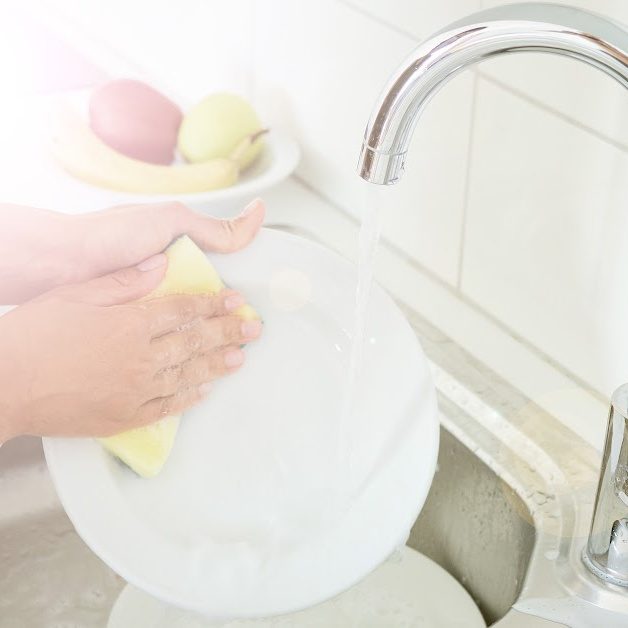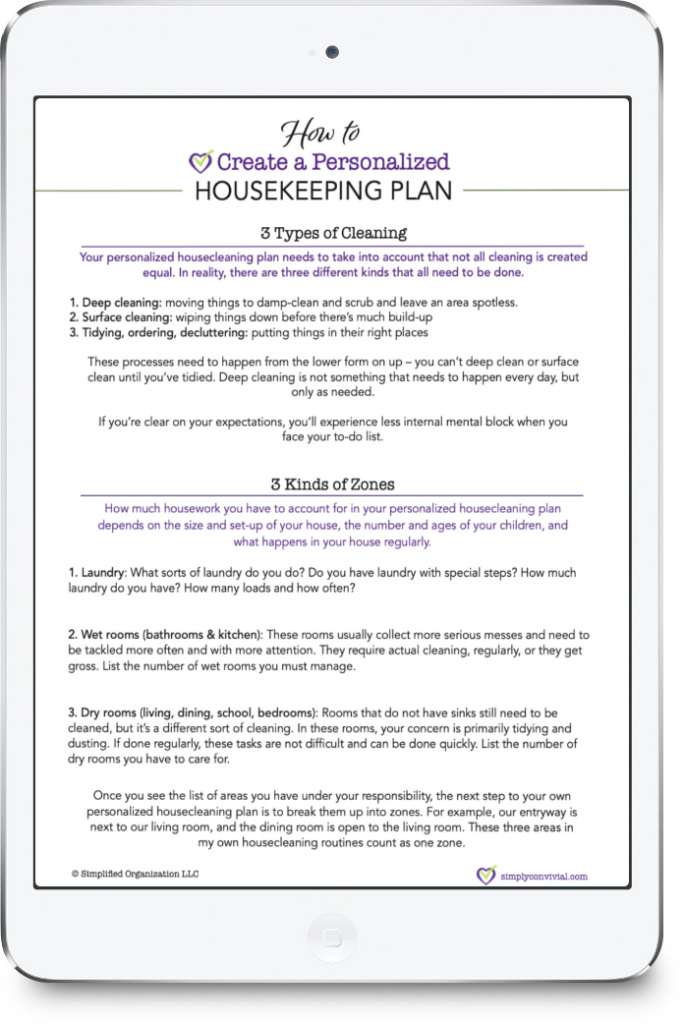When I was a young mom and homemaker, I read blogs and books on keeping house better. I didn’t love housework, but I did want to do a good job. I wanted to be a good housewife, a good homemaker.
I would try to do the cleaning routines promoted by bloggers. I copied lists and plans from magazines. I asked friends who had clean houses how they did it.
But having a clean house just seemed like one of those things that was not going to happen for me. I would go in fits and spurts, but no routines or consistent level of cleanliness ever stuck.
The only thing I was master of was the boom and bust cycle: Go on a cleaning frenzy, make a ton of progress all in a day, collapse exhausted from the effort, and wake up sad the next day that the work all had to be done again.
What I know now, nearly twenty years later, is that I was missing two things: 1) an unconscious preference for neatness and 2) an understanding of the nature of cleaning.
No tip or hack or cleaning schedule was actually going to fix either of those problems. They were the missing link between me and a consistently tidy house.
Are you a messie?
At some point nearly ten years into marriage and homekeeping, I read a book by Sandra Felton titled, How Not to Be a Messie. I laughed; I cried; I resonated.
Sandra Felton was the 80s version of A Slob Comes Clean – someone who made no progress until she realized and admitted what her real problem was, and then worked as herself, not as trying to be someone she wasn’t.
The truth is that I’d rather read a book, create a website, take a walk, or do pretty much anything other than basic maintenance housework. I prefer project mode and a disheveled home doesn’t slow me down.
So I tend to take on housework only when it gets to the point of being a project. That doesn’t work out because housework only becomes a project when you’re in a deep hole. The way to stay out of the hole of clutter and grime chaos is to have regular maintenance routines, which sounds much easier than it actually is, especially for project-oriented people like me.
However, even those of us who can tolerate disorder, who can get a lot done without sweating the details, who would rather focus on projects than the daily duties, who tend toward obsessing over one outcome and let everything else slide while we do – even we can get our act together.
But it will take a different approach than our neat, detail-oriented friends use. There are three things we can adjust as we build workable home routines so that our routines begin to feel natural rather than like contrived, pointless obstacles.
Love housework: Notice your tasks
The first tip we need to take as naturally messy types, as obsessive project types, is to simply notice the tasks. There are two components to this one step: Know what they are and notice when they’re needed.
Before we can notice our tasks, we have to know what those tasks are. If we think about housework only as minimally as possible, it’s no wonder we feel perpetually behind and caught off-guard by the work.
It turns out that minimal attention isn’t good enough. It’s not what we’re called to, so we won’t be satisfied when that’s all we give it.
Start by looking around your house, thinking through your day, and brain dumping. Write down the various tasks and chores and needs you think of. Circle the things that have to happen at least weekly on that list. These are the areas to direct our attention to deliberately.
Now that we have a written, outside-our-head list to reference, we can direct our attention to those areas from the list as our prompt. We don’t have to remember or think of it ourselves. We look at our list, then we look at the area or toward the task called out.
What’s the actual state of the space? What would it look like if it were tidy and clean? Sometimes we aren’t even sure.
So as you work through chores on your list, focus on spending 10-15 minutes of focused, concentrated effort in that area or on that task. Instead of working until it’s done (whatever that means), work for a limited amount of time and then move on to the next task.
Work expands to fill the time we give it, and for those of us who live in our heads, that means that physical work quickly turns into meandering and puttering, so we have to stop ourselves short.
If we give ourselves a short amount of time and a clear task, we can focus and get it done. Our attention must stay on the task at hand if we’re to be productive and useful in it.
Love housework: Notice your effect
One of the most effective practices that changed my perception of and attitude about housework felt ridiculous at first. Instead of just putting in my time, listening to my audiobook, and then moving on, I stopped before moving on. I looked at what I had done. I recognized that I had made the room a nicer place to be. I smiled.
Previously, I treated housework like something I had to numb myself to do – just do it, don’t think about it, because if you think about it you’ll only be discouraged by the fact that you’ll have to do it again tomorrow.
In this way, we deepen the habit of disliking housework rather than building the habit of loving it.
Even after I repented of my bad attitude about housework and worked to amend my ways, the progress felt like a slog. I did the work, but I still didn’t like the work and I still didn’t see any progress.
You know what I did? I started taking before and after photos. Sure, I did it for Instagram and not as part of some grand strategy, but something odd happened – I realized that the work did make a visual difference because I now had evidence.
After realizing that I wasn’t paying attention to the effects of my efforts, I started taking a moment – just 2-3 seconds – to stop and look at the space I’d been cleaning or tidying with affectionate attention. I’d rather just move on to the next thing, keeping my thoughts in the clouds, but by stopping and recognizing that I had improved my surroundings, I learned to value and enjoy what I was doing.
Love housework: Notice the reward of cleaning
I like to remind myself and my children that virtue is its own reward. It is good to do things that are good. If we only do things as means to other ends, we’re utilitarian. It’s very easy to slip into utilitarianism with housework because the house is useful, and more so when it’s clean.
However, utilitarianism brings no satisfaction in a job well done. Utilitarianism is unappreciative. It’s always on to other goals. Utilitarianism doesn’t care about forming virtue or loving what is true, good, and beautiful. We, however, should.
Virtue exists and messiness isn’t a virtue. There’s no upright and commendable character in literature who is also a slob. There’s a reason our culture used to have the saying cleanliness is next to godliness. We might now kick against that saying, but I believe we do because we are upset that a clean house doesn’t stay clean.
We want a clean house, but we don’t want to be people who clean up. But the virtue is in the work, not the result. We judge by appearances. We desire the appearances. But the virtue of cleanliness is in the priorities and habits of someone who keeps up with her duties, who does the work.
Cleaning house is a picture of ourselves. We are messy houses that Christ has declared clean. He is in the process in this life of cleaning us up, of remodeling and restoring us. Jesus doesn’t snap his fingers and – presto – perfect us the moment he justifies us. Sanctification – the process of being personally cleaned up – is a daily, ongoing work in our lives.
And so it is with our homes as well. Cleaning things up is a daily, ongoing work that must happen because life is being lived and we are clean people who clean up. We aren’t a people who want the result without the work or the aesthetic without the reality. We don’t want a showcase life or a showcase home. We want to live lives of humble service and obedience – and that means daily counter-wiping, dish-washing, toilet-swishing, and floor-sweeping.
As we clean, we model and image the cleaning work being done in ourselves. In that mirroring, that living analogy, we find joy and satisfaction even in the repetition.
We aren’t stuck. We are being sanctified. We aren’t failing. We are the kind of people who clean up. Therefore, we can enjoy and even love housework.



